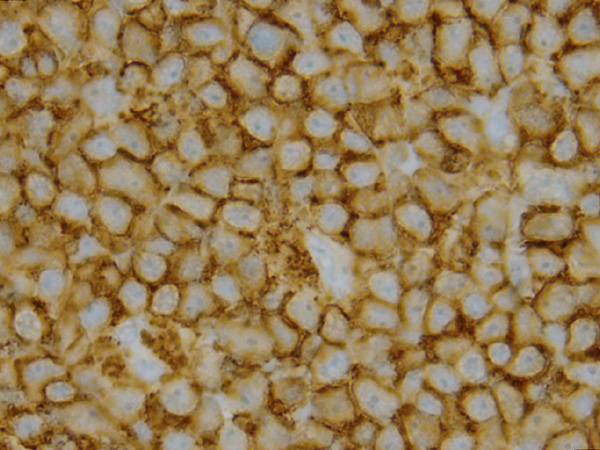A New Molecularly Targeted Therapeutic for Non-Hodgkin Lymphoma
The newly approved therapeutic is for certain patients with an aggressive type of non-Hodgkin lymphoma called mantle cell lymphoma.

The U.S. Food and Drug Administration (FDA) recently approved the molecularly targeted therapeutic acalabrutinib (Calquence) for treating adults who have an aggressive form of non-Hodgkin lymphoma called mantle cell lymphoma that has progressed despite at least one prior treatment.
Recent data show that the mantle cell lymphoma incidence rate has been increasing steadily since the turn of the century and that there were about 3,320 new cases of the disease diagnosed in the United States in 2016.
Mantle cell lymphoma arises in cells of the immune system called B cells. B cells have on their surface a protein complex called the B-cell receptor. In mantle cell lymphoma B cells, the B-cell receptor is constitutively activated, meaning it is constantly triggering multiple downstream signaling pathways that promote the survival and replication of the cancer cells.
Bruton tyrosine kinase (BTK) is a component of the signaling pathways activated by the B-cell receptor, making it a rational therapeutic target for mantle cell lymphoma.
Acalabrutinib targets BTK and it was approved for treating mantle cell lymphoma based on results from the ACE-LY-004 MCL phase II clinical trial. According to the FDA statement, 81 percent of the 124 patients who received acalabrutinib had complete or partial tumor shrinkage; 40 percent had complete tumor shrinkage and 41 percent partial tumor shrinkage.
Given that the approval of acalabrutinib is based on the overall response rate rather than overall survival data, the FDA requires AstraZeneca to conduct additional clinical trials to confirm that the new molecularly targeted therapeutic improves survival.
Acalabrutinib is the second BTK-targeted therapeutic to be approved by the FDA for patients with mantle cell lymphoma who have had disease progression despite receiving at least one other treatment. The first was ibrutinib (Imbruvica), which was approved for this use in November 2013.
Acalabrutinib is designed to be more potent and more selective for BTK than ibrutinib. As a result of acalabrutinib’s improved selectivity, meaning it has fewer “off-target” inhibitory effects on tyrosine kinases other than BTK compared with ibrutinib, it has been suggested that it may have fewer adverse side effects. However, this is yet to be determined in the clinic, and the results from an ongoing phase III clinical trial comparing acalabrutinib and ibrutinib as a treatment for patients with high-risk chronic lymphocytic leukemia that has progressed despite prior treatment should help address this issue.
The FDA approval was rendered on October 31, 2017.